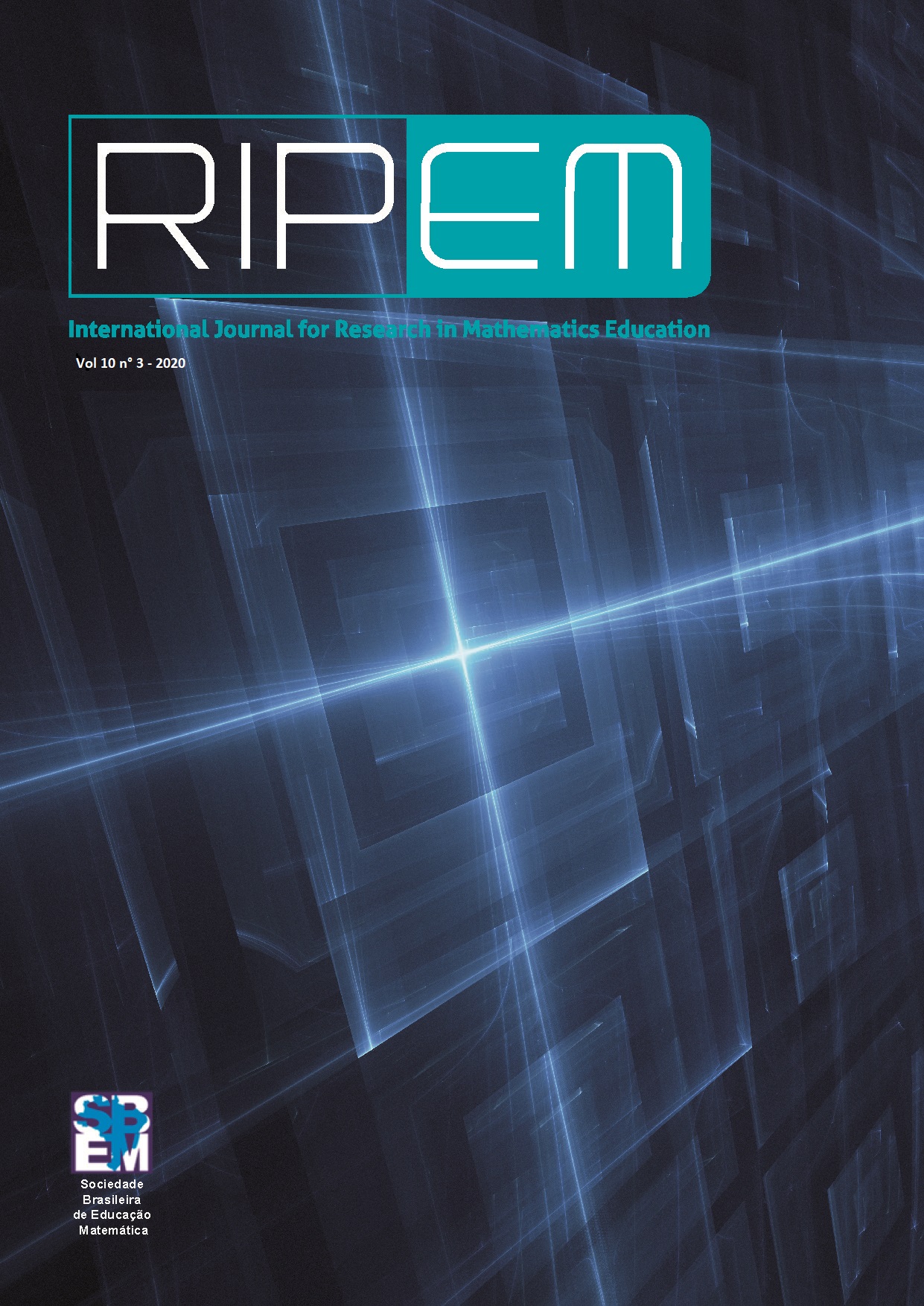Decanting “multiplications for teaching” according to analyses in teacher’s books
DOI:
https://doi.org/10.37001/ripem.v10i3.2689Keywords:
Mathematics for teaching, History of Mathematics Education, Professional Knowledge, Objectified Knowledge, Primary SchoolAbstract
Which elements characterize a "multiplication for teaching", when analyzing teacher’s Arithmetic books, at the beginning of the 20th century? This question guides this text, based on recently finalized doctoral research. The text had the collaboration of theoretical-methodological references used in this text place knowledge at the top of the studies on the constitution of professional teaching and that consider them as social, historical and cultural construction. In this way, the transformation of knowledge occurs in stages, according to theoretical and methodological references of this research. That is, from the observation and description of the informations presents in the teacher's book, we listed the main elements that the authors highlighted as guidelines for the teaching of multiplication. From these guidelines, questions were elaborated, seeking to organize and analyze knowledge to train the teacher.The third stage concerns the interpretation and systematization of this knowledge in objetictified objetctified that the teacher needed to have available to teach multiplication. The results show that a "multiplication for teaching" sought to articulate itself to the transformations that "arithmetic to teach". As a conclusion, we observed that elements such as: presentation, graduation, explanation, articulation, generalization and evaluation of multiplication, were fundamental in the characterization (decantation ) of these "multiplications for teaching".
Downloads
References
Barreto, R. (1912). Série graduada de matemática elementa:escrita para uso das escolas primárias e secundárias do E. de S. Paulo. São Paulo: Escolas profissionais Salesianas.
Barreto, R. (1915). Série graduada de matemática elementar:escrita para uso das escolas primárias e secundárias do E. de S. Paulo.São Paulo: Escolas profissionais Salesianas.
Bertini, L. F., Morais, R. S.,&Valente, W. R. (2017). A matemática a ensinar e a matemática para ensinar: novos estudos para a formação de professores. São Paulo: Editora Livraria da FÃsica.
Burke, P. (2016).O que é a história do conhecimento?(Cláudia Freire, Trad.). São Paulo: Editora Unesp.
Eulalio, J. (1907). Curso Normal de Mathematica. Rio de Janeiro: Imprensa Nacional.
Hofstetter, R. ,& Schneuwly, B.(2009).Savoirs en (trans) formation: Au coeur des professions de l'enseignement et de la formation.InR. Hofstetter & B. Schneuwly (Eds.), Savoirs in (trans) formation: au coeur des professions de l’enseignement et de la formation (pp. 7-40).Raisons éducatives.Bruxelles: De BoeckUniversité.
Hofstetter, R. ,&Schneuwly, B.(2017). Saberes: um tema central para as profissões do ensino e da formação, 2017. In R. Hofstetter,& W. R. Valente (Eds.),Saberesem (trans)formação: tema central da formação de professors (pp. 113-172). São Paulo: Livraria da FÃsica.
Monteiro de Souza, A. (1910).Aritmética Elementar. Rio de Janeiro: Typ. do Jornal do Comércio de Rodrigues & C.
Oliveira, M. A. (2015). A escola elementar de Pestalozzi e Calkins: como ensinar número? Revista Linhas, 16(31), 173 - 201.
Oliveira, M. A. (2017).A aritmética escolar e o método intuitivo: um novo saber para o curso primário (1870 – 1920).Tese de Doutorado,Universidade Federal de São Paulo, Guarulhos, Brasil.
Pinheiro, N. V. L. (2017).A aritmética sob medida: a matemática em tempos da pedagogia cientÃfica. Tese de Doutorado, Universidade Federal de São Paulo, Guarulhos, Brasil.
Roca Dordal, R. (1915).Aritmética Escolar:exercÃcios e problemas para escolas primárias, famÃlias e colégios (livro do mestre). São Paulo: Livraria Francisco Alves.
Thiré, A. (1914). Aritmética dos principiantes(3.ed.). Rio de Janeiro: Livraria Francisco Alves.
Trajano, A. (1907). Arithmetica Elementar Illustrada:ensino theorico e pratico (68ª ed.). Rio de Janeiro: Typ. Martins de Araújo & Cia.
Tolosa, B. M.[192–]. Cadernos de Problemas Aritméticos:para o 1º ano preliminar. São Paulo: Monteiro Lobato & C.
Valente, W. R. (2007). História da Educação Matemática: interrogações metodológicas. Revemat: Revista Eletrônica de Educação Matemática, 2(1),28-49.
Valente, W. R.(2011). Amatemática na formação do professor do ensino primário: São Paulo, 1875-1930. São Paulo: Annablume (Fapesp).
Valente, W. R. (2018). Processos de investigação histórica da constituição do saber profissional do professor que ensina matemática. Acta Scientiae,20(3), 377-385.
Zanatta, B. A. (2005). O método intuitivo e a percepção sensorial como legado de Pestalozzi para a geografia escolar. Cad. CEDES,25(66), 165-184.
Published
How to Cite
Issue
Section

This work is licensed under a Creative Commons Attribution-NonCommercial-NoDerivatives 4.0 International License.








